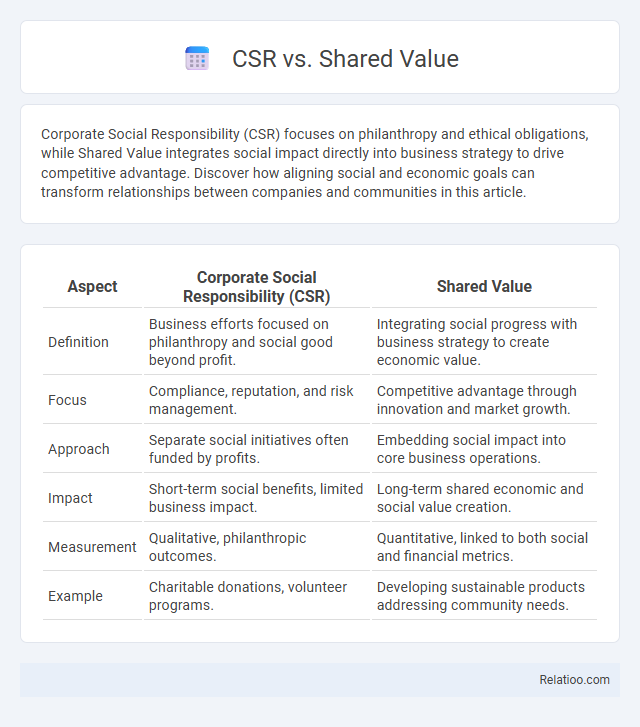Corporate Social Responsibility (CSR) focuses on philanthropy and ethical obligations, while Shared Value integrates social impact directly into business strategy to drive competitive advantage. Discover how aligning social and economic goals can transform relationships between companies and communities in this article.
Table of Comparison
| Aspect | Corporate Social Responsibility (CSR) | Shared Value |
|---|---|---|
| Definition | Business efforts focused on philanthropy and social good beyond profit. | Integrating social progress with business strategy to create economic value. |
| Focus | Compliance, reputation, and risk management. | Competitive advantage through innovation and market growth. |
| Approach | Separate social initiatives often funded by profits. | Embedding social impact into core business operations. |
| Impact | Short-term social benefits, limited business impact. | Long-term shared economic and social value creation. |
| Measurement | Qualitative, philanthropic outcomes. | Quantitative, linked to both social and financial metrics. |
| Example | Charitable donations, volunteer programs. | Developing sustainable products addressing community needs. |
Understanding CSR: Definition and Key Principles
Corporate Social Responsibility (CSR) refers to a company's commitment to ethical practices, environmental sustainability, and social well-being beyond profit maximization. Key principles of CSR include accountability, transparency, stakeholder engagement, and the integration of social and environmental concerns into business operations. While CSR focuses on responsibility and compliance, creating shared value emphasizes generating economic value in a way that also produces value for society by addressing its needs and challenges.
Exploring Shared Value: Concept and Framework
Exploring Shared Value involves understanding its core concept as creating economic value in a way that also produces value for society by addressing its challenges. Unlike traditional Corporate Social Responsibility (CSR), which often focuses on philanthropy and compliance, Shared Value integrates social improvement directly into business strategy to drive competitive advantage. The Shared Value framework is structured around three key areas: reconceiving products and markets, redefining productivity in the value chain, and enabling local cluster development.
Historical Evolution: From CSR to Shared Value
Corporate Social Responsibility (CSR) originated in the mid-20th century as companies began addressing social and environmental concerns beyond profit-making. The concept of Shared Value emerged in the 2010s, emphasizing the integration of social impact into core business strategies to drive economic success and societal progress simultaneously. Your understanding of this evolution highlights a shift from philanthropic activities to creating measurable business value through sustainable practices.
Core Differences Between CSR and Shared Value
Corporate Social Responsibility (CSR) primarily focuses on philanthropy and compliance, addressing social issues as a separate business activity without directly linking them to core business operations. Shared Value integrates social and economic goals by creating business strategies that simultaneously enhance competitiveness and advance societal progress. Your company benefits more sustainably from Shared Value by embedding social impact into its value chain instead of treating it as a sidebar effort like traditional CSR.
Business Benefits: CSR vs Shared Value
Corporate Social Responsibility (CSR) primarily focuses on mitigating negative impacts through philanthropy and ethical practices, enhancing your brand reputation and customer loyalty. Shared Value strategies drive business growth by integrating social progress directly into core competitive advantages, creating measurable economic and societal benefits. Companies adopting Shared Value often experience increased innovation, market differentiation, and long-term profitability compared to traditional CSR approaches.
Impact on Stakeholders: Employees, Communities, and Environment
Corporate Social Responsibility (CSR) primarily aims at mitigating negative effects on employees, communities, and the environment through compliance and philanthropy, often treating stakeholder impact as a cost of doing business. Shared Value integrates social and environmental improvement directly into core business strategies, creating measurable benefits for stakeholders while driving economic success. Shared Value strategies enhance employee engagement by aligning work with social purpose, foster community development through inclusive growth, and reduce environmental harm by innovating sustainable practices embedded in business models.
Case Studies: Leading Examples of CSR and Shared Value
Leading examples of CSR include companies like Ben & Jerry's, which emphasizes ethical sourcing and social justice initiatives integrated into their supply chain. Shared Value is exemplified by Nestle's Creating Shared Value strategy, which aligns business success with improving community nutrition and sustainable agriculture. Case studies reveal that Shared Value approaches often generate measurable economic and social benefits, surpassing traditional CSR's impact focused mainly on philanthropy and compliance.
Challenges and Criticisms of Each Approach
Corporate Social Responsibility (CSR) often faces criticism for being reactive and superficial, with challenges in measuring its real impact on societal issues. Shared Value is criticized for potentially prioritizing profit over genuine social progress, leading to conflicts between business goals and community needs. Your organization must navigate these complexities to balance ethical responsibility with sustainable growth in either approach.
Integrating CSR and Shared Value Strategies
Integrating CSR and Shared Value strategies enhances Your company's social impact while driving business growth by aligning social initiatives with core business objectives. CSR typically focuses on philanthropy and compliance, whereas Shared Value leverages competitive advantages to solve societal problems, creating mutual benefits. Combining these approaches fosters sustainable development and strengthens stakeholder trust, maximizing both financial performance and community well-being.
The Future of Responsible and Profitable Business Practices
Corporate Social Responsibility (CSR) traditionally emphasizes ethical obligations and philanthropy, while Shared Value integrates social impact with economic success by redefining competitiveness and innovation strategies. The future of responsible and profitable business practices lies in evolving from CSR's compliance mindset to Shared Value's strategic approach that addresses societal challenges as core business opportunities. Companies adopting Shared Value models demonstrate higher long-term profitability and sustainable growth by embedding social progress directly into their business goals.

Infographic: CSR vs Shared Value
 relatioo.com
relatioo.com